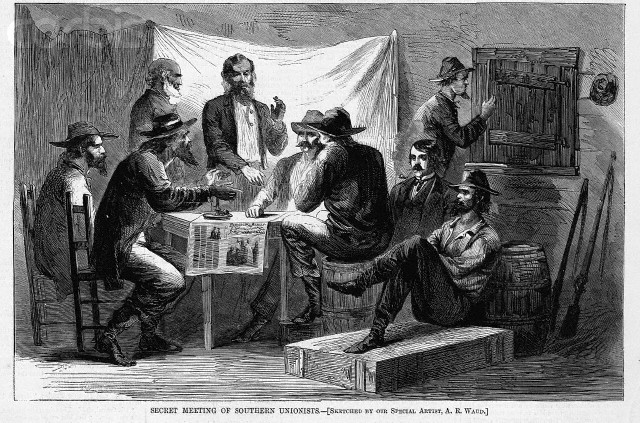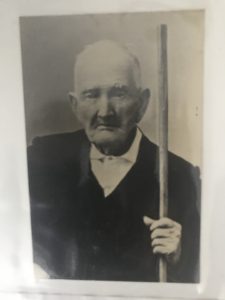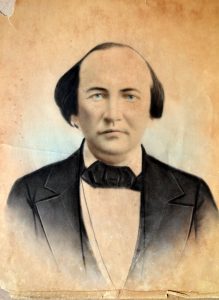Enemy on the Georgia Home Front

Wesley Shropshire returned home from the secession convention in Milledgeville, Georgia dejected and distressed. Once final passage of the secession ordinance was certain, most Union delegates changed their votes to give the measure more force, but not Shropshire. He departed for his plantation near Dirt Town, north of Rome, as one of only a few delegates who had not signed the ordinance. After seven weeks at home, Shropshire traveled to Savannah a week after the secession meeting had reconvened, but still refused to sign. Finally, after pleadings from his son Francis, a secessionist delegate, and close friend Alexander H. Stephens, Shropshire relented. Stephens had convinced him that war might be avoided if Georgia appeared strongly behind disunion.
“Under these pressures, against my judgment,” Shropshire later explained, “I put my name to the paper.” It would be his first and last act of disloyalty to the Union.[1]
In the years leading up to the Civil War, Wesley Shropshire was part of Georgia’s burgeoning class of elite planters; a man of wealth and influence. He settled in Rome in 1834, and quickly established himself as a community leader, serving as sheriff, state representative, and state senator. He amassed a plantation of more than 2,200 acres, just over the county line in Chattooga, worked by 84 slaves, and well known for its productivity.[2]

Few men in north Georgia had a better reputation for fairness and honesty, yet Union men were sorely disappointed when they heard that Shropshire had signed the secession ordinance. Sion Darnell, a native of Pickens County whose father, uncle, and brothers served in the Union army, deeply resented the actions of Shropshire and other so-called “cooperationists” at the convention: “Such Union men did more harm to the South than the secessionists, because their ‘word did not comport with their action’ and they made promises to the ear to be broken to the hope from the very beginning. Had it not been for their truculent and vacillating course, the effort of the secession convention would have been baffled, but they lacked the moral courage and yielded. This is exactly what Mr. Shropshire did.”[3]
The decision to oppose disunion was complex, personal, and not easily explained by simplistic theories of class conflict or geography. Most prominent Union men were conservatives who owned slaves and sought to settle the thorny issue of slavery through the political process within the current government.
While he was convinced that secession was wrong, Shropshire could not persuade his children to follow his lead. His son Francis was the promising young law partner of the illustrious Augustus R. Wright of Rome. He told his father that, “his generation was in for the trouble, but if he was me, he would be of my politics,” because “old men ought to be against it.” Daughter Naomi felt the same way. “Having just grown to womanhood, I naturally sided with the South,” she explained. “We laughed and jested at Father’s gloomy prognostications.”[4]
Shropshire’s wartime actions demonstrate that one did not need to leave home, join the Federal army, or hide behind bogus Confederate civil service to contribute to the Union cause. “I suppose I sent at least fifty Union men and deserters to a Mr. William Embry, who lived at the foot of Lookout Mountain,” Shropshire proclaimed. He and Embry had a secret agreement, whereby Embry would shepherd all the men that were sent to him across the mountains to Union lines. This agreement was honored up to the spring of 1864, when Embry had to go north himself to avoid Confederate authorities.
Shropshire’s role in these escapes was a poorly kept secret. James G. Sturdivant, who entertained Sherman’s spies during the war, claimed that only Shropshire’s “white head and old age” kept him from being killed by the Rebels. This did not mean that they left him alone.[5]

Shropshire endured almost daily curses and insults from the Confederates in his neighborhood. “If abuses and hopes would have saved the Union,” Shropshire recalled, “I endured them.” The Rebels, he remembered, “told me to my face that they would strip me and whip me, and called me a damned old Lincolnite.” Lewis Pyles warned that Shropshire should be “burned at the stake.” Confederate soldiers often traveled miles out of their way to “camp on old man Shropshire.” They impressed seventeen horses, one hundred head of cattle, two hundred hogs, and ten thousand bushels of corn from the plantation, refusing to pay for the goods of a known “Tory.”
When Federal troops occupied the countryside north of Rome in the spring of 1864, Shropshire rode to Gaylesville, Alabama, under guise of arrest, and spent four hours discussing the movements of Confederate General John B. Hood’s army with Union General Jefferson C. Davis. Despite his loyal reputation, the remote location of Shropshire’s plantation afforded him little protection from the Federal army, which by the autumn of 1864 was focused on defending Rome and the Western and Atlantic rail line. During the balance of the war, the Shropshire place received many unwelcome visitors.[6]
The neighborhoods near Dirt Town, a country settlement between Rome and Summerville, were teeming with roving bands of thieves and murderers. Most called themselves “scouts.” Many of these scouts were associated with two gangs. One group was led by John Gatewood of Tennessee and another was commanded by former Texas cavalryman Jack Colquitt, then residing in nearby Polk County, Georgia.
The Shropshire plantation was invaded by each gang several times during the fall and winter of 1864 ? 65. Gatewood’s outlaw band first arrived in September, placing a rope around Wesley Shropshire’s neck, removed only after the earnest pleadings of daughter Naomi. She convinced the bandits that her father was not hiding gold in the house. This was true. The gold was stashed in pockets beneath her hoop skirt.
One month later, the Federal army, led by a former Shropshire slave, finished taking everything of value outside of the home. Federal officers apologized for the necessity of stripping the plantation, assured Shropshire that they would not touch anything inside the house, and promised that he would be compensated after the war. The next day, however, a group of Union soldiers trailing behind the wagon train looted his home. Despite his losses, Wesley Shropshire was grateful that his life had been spared. Others were not so fortunate.[7]
Violence ruled the land in northern Floyd and Chattooga counties for months on end. “One poor fellow was exempt from military duty on account of ill health,” Naomi Shropshire remembered, and “was tied to a sapling and shot to death. No one knew his fate until the buzzards found him.” Fights broke out between rival gangs of bandits. A young man from Tennessee had a disagreement with Harrison Watters over the proceeds of a raid, so Watters shot him dead. “He lay there for several days,” Naomi explained, “everyone afraid for life to touch his body.” The stench grew offensive. William Davis, with the help of a local black man, rolled the poor boy in a blanket and buried him in an country grave yard.
In another incident, two renegade Union soldiers shot and killed the McSpadden brothers, two of Gatewood’s scouts, at Mrs. Burns’s house in Dirt Town Valley. A Rome correspondent to the Georgia Journal and Messenger boasted that more than a few Union men were “pitiful carcases [hanging] from swinging limbs,” and that “decaying corpses” of escaped slaves who had been caught and executed polluted the country air.[8]

Shropshire managed to keep his family safe during the war, except for son Francis, who died at Cumberland Gap, Tennessee, while in the Confederate Army. “It was distressing, but I am not to blame,” Shropshire lamented. Few antebellum Union men maintained their courage and convictions as consistently as Shropshire did during the war. Contemporaries agreed. Shropshire’s claim for war damages before the Southern Claims Commission was supported by honored Georgians, including Alexander H. Stephens, wartime governor Joseph E. Brown, and Benjamin H. Hill. The Commission approved his claim in its entirety, a rare ruling from this cautious agency.
As for his legacy, Wesley Shropshire saw himself not as the vacillating coward that Darnell described, but as one of the few elite Union men who did not compromise his principles during the war: “If a third of the South had been as open, determined and fearless as I was, the South would have been conquered much sooner.”[9]
Wesley Shropshire’s character and community service distinguished him among his fellow plantation owners. Many were conservative men like him, who feared God and worked hard to build their fortunes. When civil war threatened, however, most peers who had supported the Union cooperated with the secessionists. Shropshire worked against them. He was one of the few wealthy men in the region willing to risk nearly everything to preserve the Union that he loved.
[1] Naomi Shropshire Bale, “Reminiscences of the War Between the States, 1861-1865,” TMs, at Floyd County Library, Rome, Georgia. Claim #3163, Wesley Shropshire, Chattooga County, GA, 1878. Southern Claims Commission (hereinafter abbreviated as “SCC”). Testimony of claimant and Alexander H. Stephens.
[2] Wesley Shropshire to Wesley Shropshire, July 1, 1892. TL at Floyd County Library, Rome, Georgia.
[3] Claim #3163, Wesley Shropshire, Chattooga County, GA, 1878. SCC. Testimony of Sion A. Darnell.
[4] Bale, “Reminicences”.
[5] Claim #3163, Wesley Shropshire, Chattooga County, GA, 1878. SCC. Testimony of Tyrell Gray and James S. Sturdivant.
[6] Ibid. Testimony of claimant and Thomas J. Barbour.
[7] Ibid. Testimony of claimant. Bale, “Reminiscences.” George Magruder Battey, Jr., A History of Rome and Floyd County (Atlanta: The Webb and Vary Company, 1922), 205-209.
[8] Bale, “Reminiscences.”. Georgia Journal and Messenger, July 20, 1864, citedIn Robert S. Davis, Jr “White and Black in Blue: The Recruitment of Federal Units in Civil War North Georgia.” Georgia Historical Quarterly LXXXV, No.3, 359.
[9] Claim #3163, Wesley Shropshire, Chattooga County, GA, 1878. SCC. Testimony of claimant, Alexander H. Stephens, Joseph E. Brown and Benjamin H. Hill.
Excellent story of a little known chapter of CW history in Georgia! Thanks for sharing!
Excellent broach of a difficult topic: anti-Cause citizens during wartime. Fielding Hurst and Wesley Shropshire were notorious in the South; Clement Vallandigham and the KGC were prominent in the North. Traitors? Or rightful opposition? Depends on your point of view…
Wesley Witherspoon Shropshire was my Great,great, great grandfather and I think his sending of nearly 50 men to Embry on Lookout Mountain along with enduring torture from CSA and having a 2200 acre plantation stolen by union forces proved he was not a Rebel.
He was mine too…..
Thanks, Mike. I find the subject of wartime allegiance endlessly fascinating. Currently working on a biography that assesses the impact of private emotions on this very public act, following in the footsteps of scholars like Michael E. Woods.
Fascinating article. What an interesting character in Wesley Shropshire. I have been researching the 44th US Colored Infantry and there is another local eye witness (Margaret Espey) of a Union train of 17 wagons with 150-200 man escort mixed white and black soldiers moving through Big Texas Valley in September 1864. I’m compiling a muster role and hope to connect slaves to owners eventually.
Nice piece. Thanks!